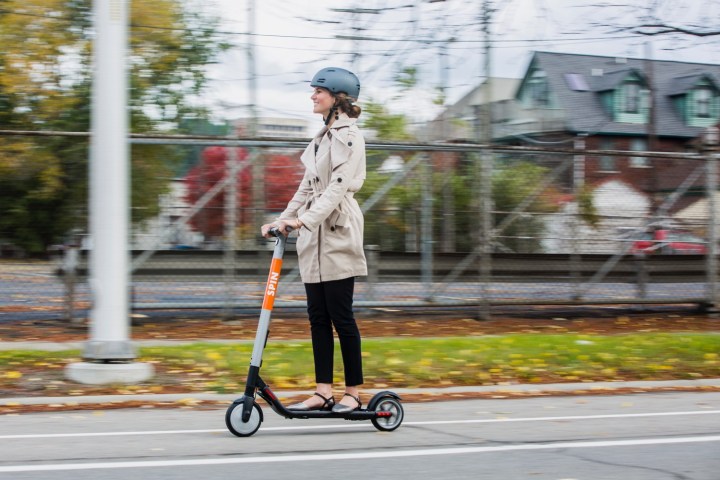
Ford has acquired scooter-sharing company Spin. It’s the latest effort by the Blue Oval to expand beyond making and selling cars and into other forms of transportation. The acquisition launches Ford into a prominent position in scooter sharing, which has exploded in popularity over the last year. Spin currently operates in 13 cities and campuses across the United States, according to Ford.
San Francisco-based Spin is one of many companies offering dockless scooter sharing. Similar to companies like Bird and Lime, Spin’s scooters can be picked up or dropped off anywhere. That means riders don’t have to go to designated stations, which makes things more convenient. But the tendency for scooters to be scattered along sidewalks and in entryways hasn’t helped the public perception of scooter-sharing services. Ford argues that Spin takes a less-antagonistic approach than other companies.
“Spin is committed to working hand in
hand with cities and universities,” Sunny Madra, vice president of Ford X, the automaker’s mobility service unit, wrote in a blog post. “They do not launch without permission; they share usage data with cities; and they work with local officials and university campuses to design educational tools around parking and riding rules.”
Renting electric scooters has quickly grown into a big business. Bird and Lime are attracting significant investment and steadily expanding their operations. The concept has also attracted Uber and Lyft, which are looking to expand beyond their core ridesharing businesses. Uber and Lyft recently deployed their first scooters in Santa Monica, California, and Denver, respectively.
Even if there’s money to be made, renting two-wheeled vehicles still seems like a big pivot from selling four-wheeled vehicles. So what does Ford see in scooter sharing?
Ford has already dabbled in transportation services that offer an alternative to cars. The automaker slapped its name on the GoBike bike-sharing service, which is operated by Lyft-owned Motivate. In 2015, Ford also launched a project called Info Cycle that equipped bicycles with data-gathering sensors, and it continues to experiment with sharing services like the Chariot shuttle service.
This multipronged approach to transportation is part of Ford’s long-term strategy, Madra said. In cities, scooters allow people to circumvent issues like traffic congestion and parking, he noted, and are inexpensive to use (Spin scooters cost $1.00 to rent plus 15 cents per minute of use). Madra said services like scooter sharing will complement Ford’s car business, which includes the ongoing development of self-driving cars.


